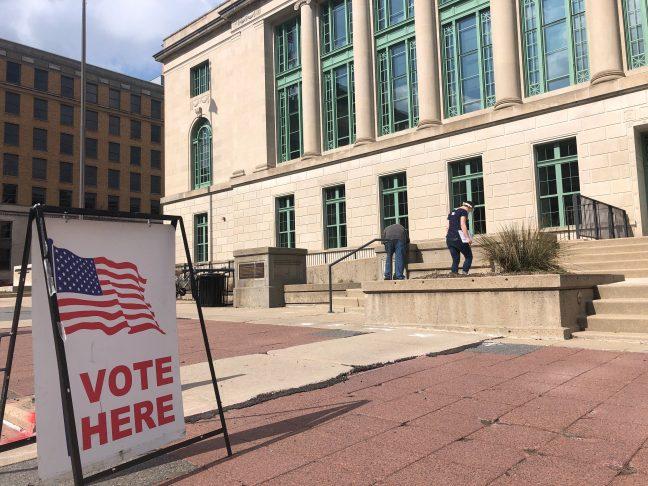It’s almost Election Day, which means the race between Democratic candidate Joe Biden and President Donald Trump is only getting tighter. Though Biden and Trump continue to dominate headlines, third-party candidates are still trying to make their way onto the ballot — namely Green Party nominee Howie Hawkins and his running mate Angela Walker.
Green Party candidates usually receive little attention compared to Democratic and Republican nominees, and Hawkins and Walker’s failed attempt to make it onto the ballot in Wisconsin ahead of the 2020 election is no help.
Most notably, the Hawkins-Walker campaign focuses on providing “real solutions to the climate crisis, the new nuclear arms race and ever-growing economic and racial inequality.” Their platform leans more to the left than that of Biden and Harris’, with promises for a $20 minimum wage, a transition to 100% clean energy use by 2030 and community-controlled policing.
To make it onto the ballot as independent candidates in Wisconsin, nominees need between 2,000 and 4,000 nominating signatures. Hawkins and Walker jointly submitted 3,880 signatures to the Wisconsin Elections Commission, but according to a complaint filed with the WEC in early August, the majority of these signatures are invalid on the basis that Walker’s listed address on the petition was incorrect.
The complaint specifies that of the nearly 4,000 signatures submitted by Hawkins and Walker, 2,046 of those signatures “appear on nomination papers that were printed with an incorrect address for Ms. Walker.”
In effect, the Green Party would be disqualified from appearing on the upcoming ballot in accordance with Nomination Paper Review Guidelines which state that “If any of the required information is missing or incorrect, no signatures on that page may be counted.”
But given how minor an address discrepancy is in the context of Walker’s capability, and by extension Hawkins’, is this attempt to knock the Green Party off the ballot a ploy to garner more votes in Biden’s favor?
Hawkins himself rejects the idea that his candidacy could “pull votes away from Biden and help Trump win Wisconsin for a second time,” arguing that if Democrats can’t win in the face of Trump’s failure to lead during COVID-19 and the nation’s recession, “it’s not the Green Party’s fault.”
In 2016, many Democrats blamed then-Green Party presidential candidate Jill Stein for Trump’s win, especially since she received 31,000 votes in Wisconsin, ultimately cementing his win by drawing progressive voters away from Democratic candidate Hillary Clinton.
It’s clear that Democrats may fear a Green Party presence on the ballot in as crucial a swing state as Wisconsin, especially when considering how the bipartisan WEC found itself deadlocked 3–3 after failing to pass the motion to block the Green Party from the ballot Aug. 20.
While the Democrats came out against Hawkins and Walker, Republicans voted in their favor. According to Jeff Mandell, a Democratic attorney from Madison who filed the complaint, it’s not “unreasonable or unfair to expect that candidates who want to be President of the United States can follow the clear rules each state sets out.” Conversely, Hawkins argues that it would be a “travesty of justice” if the Green Party is excluded from the ballot on Election Day.
Obviously, it’s in the Green Party’s interest to be on the ballot, but since the Green Party and the Democratic Party are towards the left on the political spectrum, progressive voters would be divided between Hawkins-Walker and Biden-Harris, with Republicans reaping the entirety of the conservative vote. This would likely lead to a repeat of the narrow margin seen in 2016, where Trump won by fewer than 24,000 votes.
If the WEC complaint is received and the Green Party is in fact excluded from the ballot, the majority of the state’s votes will be split Democrat-Republican, which would likely give Biden more of a leg up against Trump.
Still, as futile as Walker’s address error was on the nomination papers, the nomination paper guidelines are clear, and though such a guideline has no demonstrable impact on her leadership abilities, it is concerning that such a simple rule was overlooked. That said, both the partisan split on the WEC, as well as the address requirement in the first place, prove how overly bureaucratic elections and voting are, and how valuable Wisconsin is as a voting bloc when it comes to procuring votes for the leading political parties.
The process of getting candidates on the ballot should be just as concerning to voters as actually casting their ballot come Election Day if we want fair elections and a functioning, representative democracy. Instead, what we have here is a duopoly in which the two most prominent parties continually battle back and forth, with little effort to change such a system that repeatedly benefits the same two parties.
Anne Isman (isman@wisc.edu) is a sophomore studying economics.


